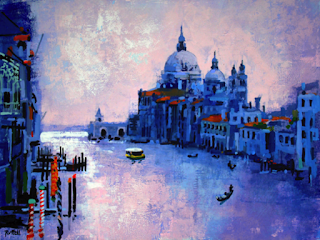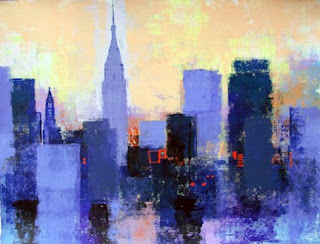7-STEPS THAT GET YOUR PICTURES INTO
THE BIG SHOPS:
Licensing
images for John Lewis or Harrods
A very
successful international artist once confided with me saying that ..”licensing won’t make artists rich but it
can make them famous.”
Then I
was asked to license some of my images for use by one of the big publishing
companies. They said that they wanted my pictures for the John Lewes stores. So
I jumped at the chance.
That was
ages ago. Did it make me rich? No.
So am I
famous? Well not very. But probably a bit better known than if I hadn’t
licensed my images to them.
Venice by
Colin Ruffell
New York
by Colin Ruffell
Currently
I have several images hanging in big department stores. They are cityscapes
showing views of London, New York, Spain, Venice etc. They were chosen by a
couple of the big publishing companies who print the images and supply framed
pictures to the retailers. So I don’t have to print, sign or number the prints,
neither do I have to frame them, sell them, or promote them. That sounds good
doesn’t it? Not quite!
So this
is what happens when you go into licensing.
1. The
licensor asks the artist to show them some images that are available for
licensing. This can be a big issue if
you have committed to publish your image as a ‘limited edition’ because there
is an understanding that limited editions should not be available as unsigned
open editions as well. So you cannot use those images.
2. The
artist supplies copies of their available images and the publisher produces a
mock up product to test their market. The problem here could be that they want
to crop the image or alter and enhance it in some other way. The artist has to
agree to the changes or just accept that the publisher knows best.
3. The
publisher proposes the product to their retail outlets and gauges possible
sales and likely turnover and profit. This stage can take a very long time.
4. The
publisher chooses the image from all of their other artist’s images that they
have going through the same process. If you are lucky!
5. The
publisher exhibits the image in a final version to their trade buyers at a
trade fair or some other location. Hold your breath!
6. The
publisher decides to go ahead with the deal and offers the artist a contract.
The offered percentage of the trade-selling price will be a pathetic pittance.
Live with it.
7. You
have got to trust that the publisher will sell the product and send the artist
quarterly or annual statements showing the results and ask the artist for an
invoice so that they can pay you your share.
[By this time you have had children and watched them grow into adults.]
Sorry. I meant to say … Send them an invoice and wait for the cheque.
Over the
years I have had publishers go bust on me, twice!
They seem
to go bust just before they issue the statements as well. Hey ho!
The final
framed product is possibly a bit cheaper than a similar image on the artists
own website. That is because it is printed in large quantities, and quicker to
produce because it is unsigned and un-numbered. It doesn’t have the tested longevity,
framing option, investment criteria, or quality control that work by self-publishing
artists would provide. But, if people like it, then it might make the artist
famous.
Artists
often ask which images are the best ones for sale in the big department stores?
I don’t
know! Go and have a look at several big
stores and see what they have got on their walls at the moment. But of course
it shouldn’t be the same because they already have those!
Oh yes!
Why stick to department stores? The publishers also supply chains of furniture
retailers and provide framed prints to garden centres here in the UK.
Or, if
you are an artist reading this, maybe your art is suitable for crockery, or
Tshirts, or dress fabric. I haven’t got into that myself but it works for some.
Licensing
also applies to publishers of greetings cards and calendars. Artists should try
them. Similar delays apply unfortunately.
If you
are an art lover who has bought one of my unsigned prints from John Lewes,
Harrods, Macys, or similar retailer, then thanks. Maybe that is how you got to
know my work, and why you are reading this blog-post.
If you
are a ‘fine art collector’ then maybe a ready framed, store bought, unsigned,
un-numbered option is not for you. You can contact the artist direct. Please
do.


No comments:
Post a Comment